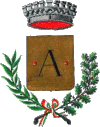Alfano
| Alfano | ||
|---|---|---|
| Comune | ||
| Comune di Alfano | ||
 |
||
|
||
 Alfano within the Province of Salerno |
||
| Location of Alfano in Italy | ||
| Coordinates: 40°11′N 15°25′E / 40.183°N 15.417°ECoordinates: 40°11′N 15°25′E / 40.183°N 15.417°E | ||
| Country | Italy | |
| Region | Campania | |
| Province / Metropolitan city | Salerno (SA) | |
| Government | ||
| • Mayor | Amelia Viterale (Lista Civica) | |
| Area | ||
| • Total | 4 km2 (2 sq mi) | |
| Elevation | 250 m (820 ft) | |
| Population (1 december 2012) | ||
| • Total | 1,082 | |
| • Density | 270/km2 (700/sq mi) | |
| Demonym(s) | Alfanesi | |
| Time zone | CET (UTC+1) | |
| • Summer (DST) | CEST (UTC+2) | |
| Postal code | 84040 | |
| Dialing code | 0974 | |
| Patron saint | Sophia of Rome and Matthew the Evangelist | |
| Saint day | December 6 (Saint Nicholas) | |
| Website | Official website | |
Alfano is a village and small comune in the province of Salerno in the Campania region of south-western Italy. As of December 31, 2012 the comune had a population of 1082.
There is little reliable evidence on the ancient history of Alfano. However, according to tradition a large city existed on the slopes of Mount Centaurino, near the present frazione of Roccagloriosa, but this would have been destroyed in a catastrophic earthquake.
In 1496 the town was given to the Neapolitan noble Giovanni Carafa, Duke of Paliano.
Alfano borders with the municipalities of Laurito, Roccagloriosa and Rofrano.
The main church in Alfano is the Church of Saint Nicholas. The Baronal Novelli Palace dates back to the 18th century. It has a grand entrance of stone, leading to a hall, and for some time served as the Town Hall of Alfano.
Palazzo dei Baroni Speranza, another palace, belonged to the Baron Speranza di Laurito. The palace, a large complex building complex elevated above the town, contains a central courtyard.
The comune is a renowned producer of wine. Although the soils are amongst the poorest in of the country, given the harshness of the territory and the dryness of soils, local grape varieties were introduced to Elea and Paestum by ancient Greek colonists and adapted to grow in clay-calcareous soils and climate of the area.
The Cilento brand of wine was established on May 3, 1989 and is produced in three varieties. Paying homage the Ancient Greek colonists in Paestum and the viniculture experienced there, on November 22, 1995, the brand of wine Paestum went into production.
...
Wikipedia


